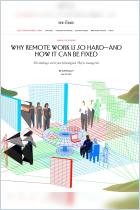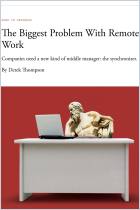The pandemic legitimized a new climate of remote work for employees who welcomed the opportunity for greater autonomy and work flexibility and improved productivity. Nonetheless, some managers resisted change, and triggered what has become known as the “remote-work war.” These so-called “bad bosses” remain stuck in outdated thinking and practice poor people management. As Greg Rosalsky reports for NPR, the research findings of economist Nicholas Bloom and his colleagues bear out the benefits of remote work and the need for managers to accept it as a best practice, whether on its own or in hybrid combination with in-office work.
The pandemic exposed the rift between employees who prefer the flexibility of remote work and controlling managers who want them in the office.
The pandemic era of remote work challenges micro-managers who prefer hands-on supervision to fostering and nurturing workers autonomy. Bosses who insist post-pandemic employees return to the office full time are often those who lacked preparation for their promotion to management.
These “bad bosses” focus more on appearances and less on productivity, though many staffers can be productive without in-person supervision. Bad bosses also seem unable to achieve or support work-life balance. As the pandemic began to subside, micro-managers sought a return of workers to the office-based norm – these managers’ comfort zone. This created friction with employees who prefer the autonomy of remote work.
Employees may have won the initial battle, but not the remote war.
A team of economists conducted a remote work survey of thousands of workers in 27 nations. Their results, co-authored by Stanford economist Nicholas Bloom,&#...



















Comment on this summary or Comenzar discusión